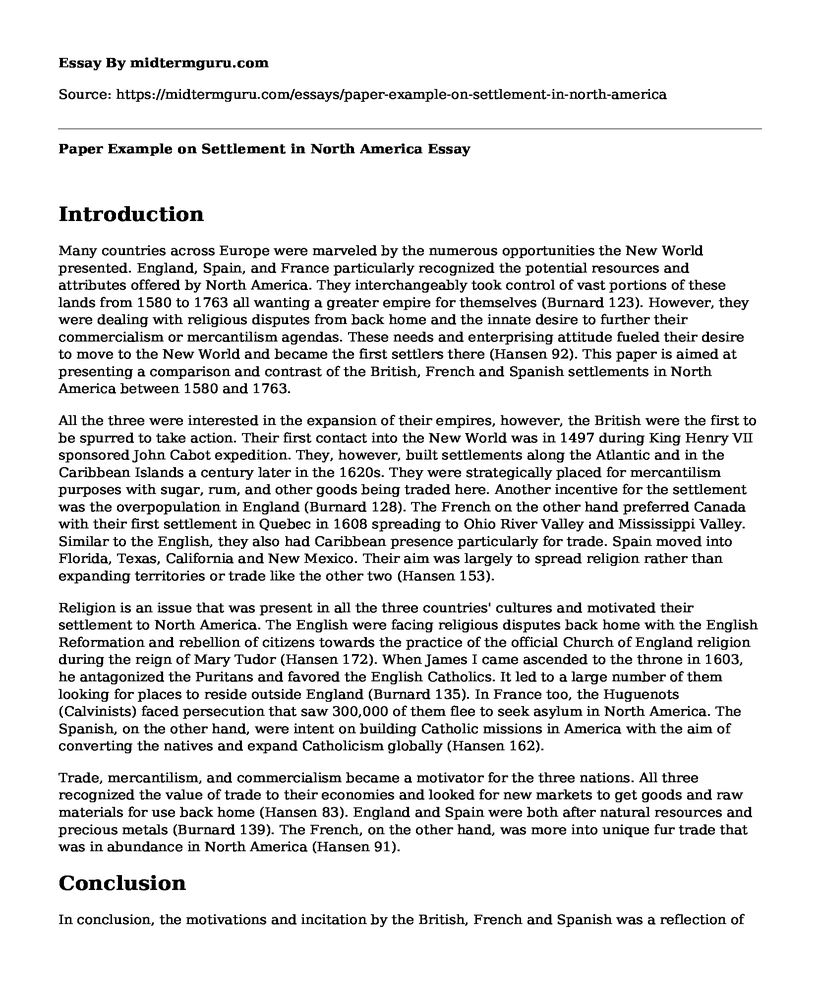Introduction
Many countries across Europe were marveled by the numerous opportunities the New World presented. England, Spain, and France particularly recognized the potential resources and attributes offered by North America. They interchangeably took control of vast portions of these lands from 1580 to 1763 all wanting a greater empire for themselves (Burnard 123). However, they were dealing with religious disputes from back home and the innate desire to further their commercialism or mercantilism agendas. These needs and enterprising attitude fueled their desire to move to the New World and became the first settlers there (Hansen 92). This paper is aimed at presenting a comparison and contrast of the British, French and Spanish settlements in North America between 1580 and 1763.
All the three were interested in the expansion of their empires, however, the British were the first to be spurred to take action. Their first contact into the New World was in 1497 during King Henry VII sponsored John Cabot expedition. They, however, built settlements along the Atlantic and in the Caribbean Islands a century later in the 1620s. They were strategically placed for mercantilism purposes with sugar, rum, and other goods being traded here. Another incentive for the settlement was the overpopulation in England (Burnard 128). The French on the other hand preferred Canada with their first settlement in Quebec in 1608 spreading to Ohio River Valley and Mississippi Valley. Similar to the English, they also had Caribbean presence particularly for trade. Spain moved into Florida, Texas, California and New Mexico. Their aim was largely to spread religion rather than expanding territories or trade like the other two (Hansen 153).
Religion is an issue that was present in all the three countries' cultures and motivated their settlement to North America. The English were facing religious disputes back home with the English Reformation and rebellion of citizens towards the practice of the official Church of England religion during the reign of Mary Tudor (Hansen 172). When James I came ascended to the throne in 1603, he antagonized the Puritans and favored the English Catholics. It led to a large number of them looking for places to reside outside England (Burnard 135). In France too, the Huguenots (Calvinists) faced persecution that saw 300,000 of them flee to seek asylum in North America. The Spanish, on the other hand, were intent on building Catholic missions in America with the aim of converting the natives and expand Catholicism globally (Hansen 162).
Trade, mercantilism, and commercialism became a motivator for the three nations. All three recognized the value of trade to their economies and looked for new markets to get goods and raw materials for use back home (Hansen 83). England and Spain were both after natural resources and precious metals (Burnard 139). The French, on the other hand, was more into unique fur trade that was in abundance in North America (Hansen 91).
Conclusion
In conclusion, the motivations and incitation by the British, French and Spanish was a reflection of the nation's needs and desires. The desire to expand territories, look for settlements, spread religion and trade made the discovery of North America a monumental historic phenomenon.
Works Cited
Burnard, Trevor. "Settlement and Region in British America, 1607-1763." Oxford Bibliographies Online Datasets, 2011.
Hansen, Valerie. Voyages in World History: Volume 2. 2014.
Cite this page
Paper Example on Settlement in North America. (2022, Sep 06). Retrieved from https://midtermguru.com/essays/paper-example-on-settlement-in-north-america
If you are the original author of this essay and no longer wish to have it published on the midtermguru.com website, please click below to request its removal:
- Studying the Presidency Essay Example
- Paper Example on France and England Politics in 1600s to 1800s
- Essay Sample on Relationship Between the United States and Saudi Arabia
- Essay Sample on Social Policy and Economic Policy
- Can "The People" Check the President's Actions? - Essay Sample
- Americans' Support of Vietnam War: Cold War Causes and Effects - Essay Sample
- HITECH: Promoting EHRs to Improve Quality and Safety - Research Paper







